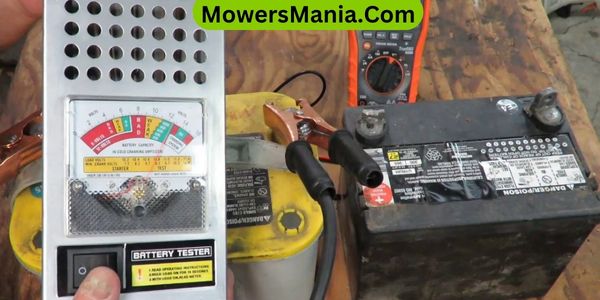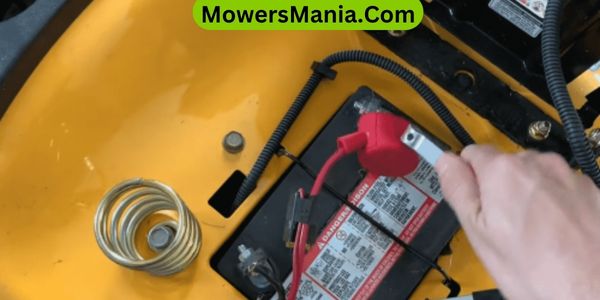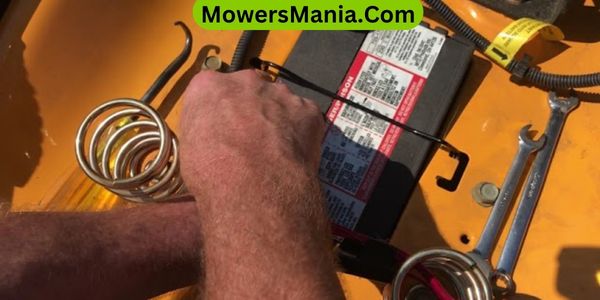If you’re wondering how many volts your lawn mower battery should have, you’re in the right place.
Understanding the importance of battery voltage, the common voltages available, and factors affecting voltage will help you choose the right one for your mower.

Let’s dive into how voltage impacts battery performance and longevity.
Importance of Lawn Mower Battery Voltage
You should understand that the voltage of a lawn mower battery significantly impacts its performance and longevity.
The voltage rating of a battery indicates the electrical potential difference between its positive and negative terminals. For most lawn mowers, a 12-volt battery is standard. This voltage is crucial for providing the necessary power to start the engine and run the various electrical components on the mower.
If the battery voltage is too low, it may struggle to start the mower, leading to slow cranking and potential damage to the starter motor over time. On the other hand, if the voltage is too high, it can cause overheating and damage to the electrical components.
Additionally, the voltage level affects the overall lifespan of the battery. A higher voltage often means a longer battery life, as it can provide sustained power for a longer duration.
Therefore, it’s essential to ensure that the lawn mower battery’s voltage is within the manufacturer’s specified range to optimize its performance and durability.
Common Voltages for Lawn Mower Batteries
A typical lawn mower battery commonly operates at a voltage of 12 volts. This is the most widely used voltage for lawn mower batteries due to its ability to provide sufficient power for starting and running the mower’s engine.
However, there are also other common voltages for lawn mower batteries, including 6 volts and 24 volts.
The 6-volt battery is commonly found in older or smaller lawn mowers. While it may not offer as much power as a 12-volt battery, it can still effectively operate smaller mowers with less demanding power requirements.
On the other hand, 24-volt batteries are typically used in larger commercial or industrial-grade lawn mowers. These batteries provide a higher voltage output to meet the increased power demands of larger, more powerful engines.
It’s important to note that the voltage requirement for a lawn mower battery is directly related to the size and power of the mower’s engine.
Therefore, when replacing a battery, it’s crucial to match the voltage rating to the specific requirements of the mower to ensure optimal performance.
Factors Affecting Battery Voltage
When considering lawn mower battery voltage, factors such as the size and power requirements of the mower’s engine play a crucial role. The size of the engine directly affects the power requirements, which in turn impacts the voltage needed from the battery. Larger engines generally require higher voltages to start and operate efficiently.
The capacity of the battery, measured in ampere-hours (Ah), influences its voltage output. Higher capacity batteries may have different voltage requirements compared to lower capacity ones.
Temperature can affect the voltage output of a battery. Extreme temperatures, whether hot or cold, can impact the battery’s ability to deliver the required voltage.
As with any battery, the age and overall condition of the lawn mower battery can impact its voltage output. Older or deteriorating batteries may struggle to maintain the necessary voltage levels.
Understanding these factors can help you select the right battery voltage for your specific lawn mower and ensure optimal performance.
Choosing the Right Voltage for Your Mower

Considering the factors affecting lawn mower battery voltage, selecting the right voltage for your mower is crucial for ensuring optimal performance and efficiency.
When choosing the voltage for your lawn mower battery, it’s important to match it with the voltage requirements of your specific mower model.
Most electric mowers operate on either 36V or 40V batteries, while corded electric mowers typically run on 120V. For smaller yards, a 36V battery may suffice, providing enough power for efficient mowing without being too heavy.
However, if you have a larger yard or need extra power for tougher grass or terrain, a 40V battery may be more suitable.
It’s essential to consider the size of your lawn, the type of grass, and any additional features your mower may have, such as self-propulsion or mulching capabilities, when determining the right voltage.
Selecting the appropriate voltage ensures that your mower can operate at its full potential, delivering reliable performance and extending the battery’s lifespan.
Understanding Voltage and Battery Performance
To optimize your mower’s performance, understanding the relationship between voltage and battery performance is crucial.
Voltage directly impacts the power and efficiency of your lawn mower, so it’s important to grasp how it influences battery performance.
Here are four key points to help you understand the significance of voltage in your mower’s battery:
- Power Output: Voltage determines the power output of the battery, affecting the mower’s ability to cut through tough grass and handle challenging terrains effectively.
- Run Time: Higher voltage batteries generally provide longer run times, allowing you to mow larger areas without needing to recharge frequently.
- Charging Time: A higher voltage battery typically charges faster, reducing downtime and ensuring that your mower is ready when you need it.
- Motor Performance: Voltage directly impacts the motor’s performance, influencing the speed and torque of the mower, which is crucial for achieving a clean and efficient cut.
Understanding these aspects will help you make informed decisions when choosing a battery for your lawn mower, ensuring that it meets your specific needs and delivers optimal performance.
Maintaining Optimal Voltage for Longevity

To ensure optimal longevity of your lawn mower battery, it’s essential to maintain a consistent voltage level, which directly impacts the performance and efficiency of the mower.
Regularly check the voltage of your battery using a multimeter to ensure it stays within the manufacturer’s recommended range. If the voltage drops below this range, it can lead to decreased performance and a shortened lifespan of the battery.
To maintain the optimal voltage, keep the battery terminals clean and free of corrosion, as this can impede the flow of electricity and cause voltage fluctuations.
Additionally, make sure the battery is securely connected and that the charging system is functioning correctly to prevent under or overcharging, both of which can affect the battery’s voltage.
Extreme temperatures can also impact voltage levels, so store the mower in a cool, dry place when not in use. By consistently monitoring and maintaining the voltage of your lawn mower battery, you can ensure its longevity and keep your mower performing at its best.
Frequently Asked Questions [FAQs]
Can I Use a Car Battery in Place of a Lawn Mower Battery?
You can use a car battery in place of a lawn mower battery, but be cautious. Car batteries have more power, which can be harmful for the lawn mower. Check the compatibility and consult a professional if unsure.
What Are the Differences Between Lead-Acid and Lithium-Ion Lawn Mower Batteries in Terms of Voltage?
When comparing lead-acid and lithium-ion lawn mower batteries in terms of voltage, the former typically operates at 12 volts, while the latter can range from 40 to 80 volts. It’s important to consider compatibility with your mower.
How Does Temperature Affect the Voltage Output of a Lawn Mower Battery?
When temperature changes, it affects the voltage output of a lawn mower battery. Lower temperatures can reduce the voltage, while higher temperatures can increase it. Keep in mind these fluctuations for optimal performance.
Are There Any Safety Concerns Related to the Voltage of a Lawn Mower Battery?
When using a lawn mower battery, it’s important to be aware of safety concerns related to the voltage. Always follow proper handling procedures and use caution to avoid electric shock or other potential hazards.
Can I Increase the Voltage of My Lawn Mower Battery to Improve Performance?
You can increase the voltage of your lawn mower battery to improve performance, but it’s important to ensure that your mower’s components can handle the higher voltage without causing damage or safety issues.
Conclusion
So, when it comes to your lawn mower battery, knowing the right voltage is crucial for optimal performance.
Factors like battery size and mower power requirements will determine the best voltage for your specific needs.
Keep an eye on your battery’s voltage and make sure to maintain it for longevity.
With the right voltage, your lawn mower will be ready to tackle any yard work with ease.



